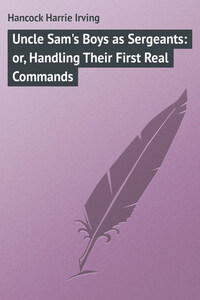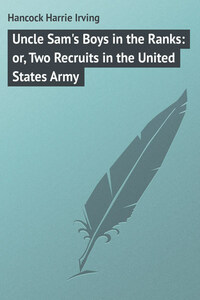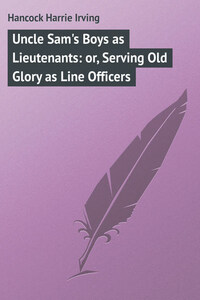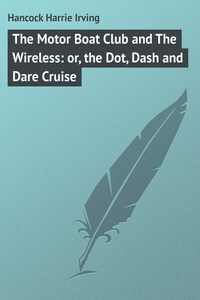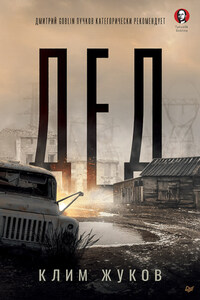CHAPTER I
"TIPPED OFF" BY WIG-WAG
LIEUTENANT POPE, battalion adjutant of the first battalion of the Thirty-fourth United States Infantry, looked up from his office desk as the door swung open and a smart, trim-looking young corporal strode in.
Pausing before the desk, the young corporal came to a precise, formal salute. Then, dropping his right hand to his side, the soldier stood at attention.
"Good morning, Corporal Overton."
"Good morning, sir."
"What do you wish?"
"I have been making inquiries, sir," continued Corporal Hal Overton, "and I am informed that you have some signaling flags among the quartermaster's stores."
"I believe I have," nodded Lieutenant Pope.
"I have come to ask, sir, if I may borrow a couple of the flags."
"Borrow? Then, Corporal, I take it that you do not want the flags for duty purposes?"
"Not immediately for duty purposes, sir. Corporal Terry and myself would like to practise at wig-wagging until we become reasonably expert. Sergeant Hupner is an expert at wig-wagging, I understand."
"Yes, indeed," agreed Lieutenant Pope heartily. "Even in the Signal Corps of the Army there are few better signalmen than the sergeant."
"So I understand, sir. Corporal Terry and I are delighted at the idea of having the sergeant instruct us."
"But what do you want to do, especially, with flag signaling?" inquired the quartermaster.
"It is simply, sir, that we want to make ourselves better soldiers."
"It is rarely that we find better soldiers than Terry and yourself," replied the quartermaster, with a friendly smile. "But you are quite right, none the less. A soldier can never know too much of military duties. I see no objection whatever to your having the flags, but as they are not a matter of ordinary issue, I think it better for me to seek Major Silsbee's authority for issuing them."
"Would it have been better if I had gone to the battalion commander in the first place, sir?"
"No; whenever you wish anything in the Army it is usually better to go direct to the officer who has that thing in charge in his department, save when it is something that you are expected to draw through your company officers."
"It was Captain Cortland who sent me to you, sir, but he said he had no authority to draw a requisition for signal flags."
"You have taken the right course, Corporal. If Major Silsbee is in his office it will take but a moment more."
While the young corporal remained at attention Lieutenant Pope turned to his telephone and called for the battalion commander.
"It's all right, Corporal," nodded the lieutenant, hanging up the receiver. Then he wrote on a slip of official paper. "Here is an order on which the quartermaster sergeant will issue you two signal flags. You are, of course, responsible for the flags, or for the value."
"Yes, sir. Thank you, sir."
Five minutes later Corporal Hal Overton stepped briskly from the building in which the quartermaster's stores were kept. Under his left arm he carried two signal flags, rolled and attached to short staffs.
"Noll hasn't shown up yet. I hope he won't be long," murmured Hal, gazing across the parade grounds in the direction of the barracks of enlisted men. "Bunkie and I have a lot to do to-day."
Readers of the preceding volumes in this series will need no introduction to Corporals Hal Overton and Noll Terry, of the Thirty-fourth United States Infantry.
The headquarters battalion to which these two earnest young soldiers were attached was still stationed at Fort Clowdry. Readers of "Uncle Sam's Boys in the Ranks" are familiar with the circumstances under which Overton and Terry first enlisted at a recruiting office in New York City. These same readers also know how the two young soldiers put in several weeks of steady drilling at a recruit rendezvous near New York, where they learned the first steps in the soldier's strenuous calling. Our readers are also familiar with all the many things that happened during that period of recruit instruction, and how Hal and Noll, while traveling through the Rockies on their way to join their regiment, aided in resisting an attempt by robbers to hold up the United States mail train. Our readers are well aware of all the exciting episodes of that first garrison life, including the life and death fight that Hal Overton had with thieves while he was on sentry duty in officers' row, and of the efforts of one worthless character in the battalion to discredit and disgrace the service of both splendid but new young soldiers.
In the second volume, "Uncle Sam's Boys on Field Duty," our readers were admitted to equally exciting scenes of a wholly different nature. This volume dealt largely with the troops while away in rough country, under practical instruction in the actual duties of soldiers in the field in war time. Just how soldiers learn the grim business of war was most fully set forth in this volume. Among other hosts of entertaining incidents our readers will recall how Hal, on scouting duty, robbed the "enemy's" outpost of rifles, canteens and secured even the corporal's shoes. Some of Hal's and Noll's other brilliant scouting successes are therein told, and it is described how Hal and Noll finally gained the information that resulted in their own side gaining the victory in the mimic campaign. That volume also told how Lieutenant Prescott, aided by Soldiers Hal and Noll, succeeded at very nearly the cost of their lives in arresting a notorious and desperate criminal for the civil authorities, and how all this was done in the most soldier-like manner. It was such deeds as the scouting and the clever arrest that resulted in the appointment of the two chums as corporals. Then there was the affair, while the regulars were on duty in summer encampment with the Colorado National Guard, in which Hal and Noll, acting under impulses of the highest chivalry, got themselves into trouble that came very near to driving them out of the service.
